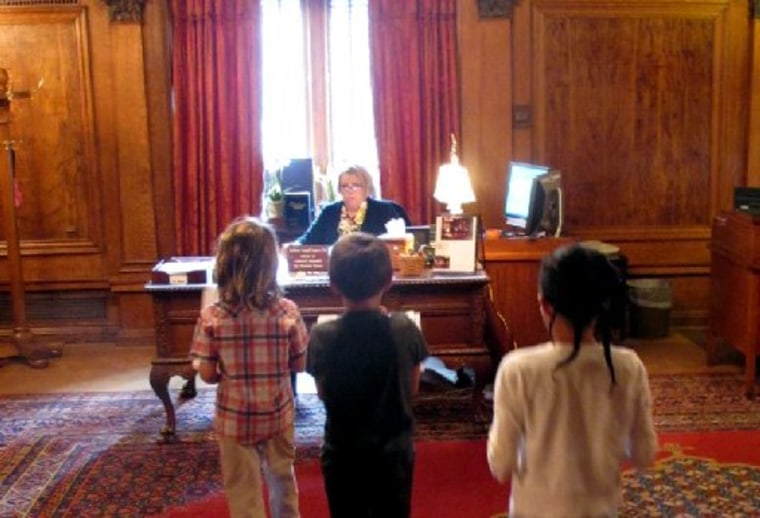State and municipal governments across the country have been strip-mining their school districts in an attempt to defray budget deficits. In Michigan, an entire school district temporarily shut down due to lack of funds, while another fired all of its teachers. In Illinois, Chicago's school board voted to "consolidate" its resources by permanently shuttering 50 schools.
And now it's Pennsylvania's turn. There the school district is moving forward with plans to lay off some 3,783 education professionals and scrap 23 schools as part of a plan to reduce its $304 million deficit. Defenders of the new budget have called it regrettable—but necessary.
The School Reform Commission, which drafted the plan, "made tough choices, but they made the right choice," Philadelphia Mayor Michael Nutter, a Democrat, said on Monday's All In. "We need to downsize the system.”
But not everyone thinks such deep cuts are inevitable. Instead, critics see a man-made crisis, instigated by unnecessary reductions to state aid.
"What we're seeing is just a dramatic loss of funding from the state," said Democratic state Sen. Vincent Hughes, whose district encompasses parts of Philadelphia. "Basically, funding is being snatched away. It has a terrible impact on the classroom."
When Republican Gov. Tom Corbett took office in 2011, Pennsylvania was facing a budget deficit of about $4 billion, thanks in part to the consequences of the recession. While the federal American Recovery and Reinvestment Act of 2009 (ARRA) had apportioned some emergency stimulus funds to the state, the money was about to dry up as the relevant provisions reached their expiration date. So Corbett proposed an austerity budget that would cut over $1 billion from education.
But Corbett's budget only imposed austerity on one side of the balance sheets. While cutting billions of dollars from education and other social spending, Corbett proposed that taxes stay where they were—or, in some cases, go even lower.
"It's pretty simple," Hughes told msnbc. "Governor Corbett was elected, and he immediately began cutting education funding. At the same time, he gave tax giveaways to the largest corporations in the commonwealth."
One of the greatest beneficiaries has been big energy. Pennsylvania has one of the lowest drilling fees for natural gas in the country, according to the Pennsylvania Budget and Policy Center (PBPC). In September 2012, the left-leaning budget think tank estimated that Pennsylvania would have collected some $538 million in revenue from shale oil fracking since 2009, if only the state had West Virginia's natural gas tax.
While the final 2011 budget for the state cut less from education than Corbett's plan suggested, it still slashed about $961 million. Roughly one-third of those cuts fell on the Philadelphia school district alone, PBPC director Sharon Ward told msnbc.
"Philadelphia is the most extreme example of the problem, but it is only one of the school districts in Pennsylvania that is in extreme distress because of the budget cuts that occurred and the failure to do anything significant to respond or replace the dollars that were lost," she said. The city of Allentown has also fallen on hard times, and recently laid off 99 teachers in order to save cash.
Ward said she believes the defunding of education has less to do with fiscal necessity than the state government's vision of what education should look like.
"Their education priorities were privatization; they were vouchers and charter schools," she said. "So they clearly wanted to move in a different direction, and so public education was not and is not the administration's priority."
A representative of Corbett's administration told msnbc that Corbett had "done the exact opposite" of defunding public education, at least if one includes his budget proposal for the coming fiscal year.
"Including the proposed 2013-14 state budget, Governor Corbett has increased total state funding to public schools by $1.25 billion over the past three years—more than restoring the $1.1 billion loss of federal stimulus dollars in 2011," wrote Department of Education press secretary Timothy Eller.
